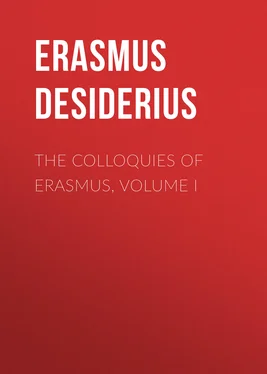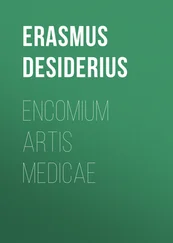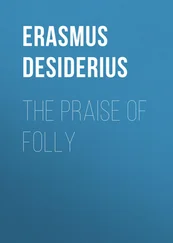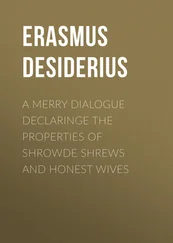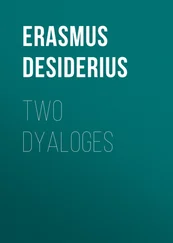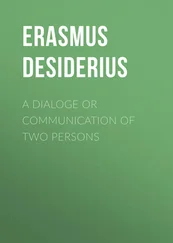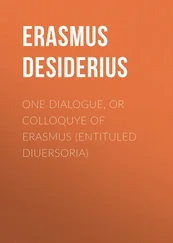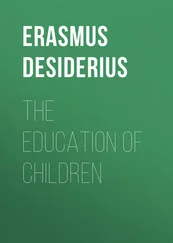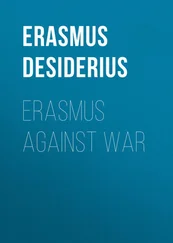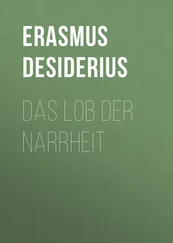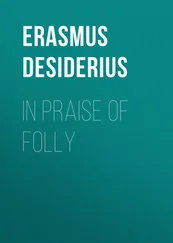Desiderius Erasmus - The Colloquies of Erasmus, Volume I
Здесь есть возможность читать онлайн «Desiderius Erasmus - The Colloquies of Erasmus, Volume I» — ознакомительный отрывок электронной книги совершенно бесплатно, а после прочтения отрывка купить полную версию. В некоторых случаях можно слушать аудио, скачать через торрент в формате fb2 и присутствует краткое содержание. Жанр: foreign_prose, foreign_antique, на английском языке. Описание произведения, (предисловие) а так же отзывы посетителей доступны на портале библиотеки ЛибКат.
- Название:The Colloquies of Erasmus, Volume I
- Автор:
- Жанр:
- Год:неизвестен
- ISBN:нет данных
- Рейтинг книги:5 / 5. Голосов: 1
-
Избранное:Добавить в избранное
- Отзывы:
-
Ваша оценка:
- 100
- 1
- 2
- 3
- 4
- 5
The Colloquies of Erasmus, Volume I: краткое содержание, описание и аннотация
Предлагаем к чтению аннотацию, описание, краткое содержание или предисловие (зависит от того, что написал сам автор книги «The Colloquies of Erasmus, Volume I»). Если вы не нашли необходимую информацию о книге — напишите в комментариях, мы постараемся отыскать её.
The Colloquies of Erasmus, Volume I — читать онлайн ознакомительный отрывок
Ниже представлен текст книги, разбитый по страницам. Система сохранения места последней прочитанной страницы, позволяет с удобством читать онлайн бесплатно книгу «The Colloquies of Erasmus, Volume I», без необходимости каждый раз заново искать на чём Вы остановились. Поставьте закладку, и сможете в любой момент перейти на страницу, на которой закончили чтение.
Интервал:
Закладка:
This last work of the Colloquies, with the addition of an appendix, is issued in the month of September, 1524._
From a letter of Erasmus dated 5th Oct. 1532, we gather some further particulars about the obnoxious person above referred to. His name was Lambert Campester. Subsequently to his exploit at Paris in printing a garbled edition of the Colloquies, he "fled to Leyden; and pretending to be a great friend of Erasmus, found a patron, from whom having soon stolen 300 crowns, fled, was taken in his flight amongst some girls, and would have been nailed to a cross, had not his sacred Dominican cowl saved him. He, I say, many other offences and crimes having been proved against him, is at length in a certain town of Germany, called, I think, Zorst, in the Duchy of Juliers,—his cowl thrown aside, teaching the Gospel, that is, mere sedition. The Duke begged them to turn the fellow out. They answered that they could not do without their preacher. And this sort of plague spreads from day to day."
ERASMUS ROTERODAMUS TO THE DIVINES OF LOUVAIN ,
His dearly beloved brethren in the Lord, greeting.
A matter has been brought to my knowledge, not only by rumour, but by the letters of trustworthy friends, expressly stating in what words, in what place, a calumny was directed against me in our midst, through the agency of a well-known person, who is ever true to himself; whose very character and former doings lead one to assume as ascertained fact what in another would have been but probable. Accordingly, I thought I ought to make no concealment of the matter; especially from you, whose part it was to restrain the unbridled impudence of the fellow, if not for my sake, at all events for that of your Order.
He boasts and vociferates that in the book of Colloquies there are four passages more than heretical: concerning the Eating of meats and Fasting , concerning Indulgences , and concerning Vows , Although such be his bold and impudent assertion, whoever reads the book in its entirety will find the facts to be otherwise. If, however, leisure be wanting for the reading of trifles of this description, I will briefly lay the matter open. But before I approach it, I think well to make three prefatory remarks.
First, in this matter contempt of the Emperor's edict 3 3 Edict of the Emperor Charles V.: 1523.
cannot be laid to my charge. For I understand it was published May 6th, 1522, whereas this book was printed long before: and that at Basle, where no Imperial edict had up to the time been made known, whether publicly or privately.
Secondly, although in that book I do not teach dogmas of Faith, but formulae for speaking Latin; yet there are matters intermixed by the way, which conduce to good manners. Now if, when a theme has been previously written down in German or French, a master should teach his boys to render the sense in Latin thus: Utinam nihil edant praeter allia, qui nobis hos dies pisculentos invexerunt . ("Would they might eat naught but garlic, who imposed these fish-days upon us.") Or this: Utinam inedia pereant, qui liberos homines adigunt ac jejunandi necessitatem . ("Would they might starve to death, who force the necessity of fasting on free men.") Or this: Digni sunt ut fumo pereant qui nobis Dispensationum ad Indulgentiarum fumos tam care vendunt . ("They deserve to be stifled to death who sell us the smokes (pretences) of dispensations and indulgences at so dear a rate.") Or this: Utinam vere castrentur, qui nolentes arcent à matrimonio . ("Would they might indeed be made eunuchs of, who keep people from marrying, against their will")—I ask, whether he should be forced to defend himself, for having taught how to turn a sentence, though of bad meaning, into good Latin words? I think there is no one so unjust, as to deem this just.
Thirdly, I had in the first instance to take care what sort of person it should be to whom I ascribe the speech in the dialogue. For I do not there represent a divine preaching, but good fellows having a gossip together. Now if any one is so unfair as to refuse to concede me the quality of the person represented, he ought, by the same reasoning, to lay it to my charge, that there one Augustine (I think) disparages the Stoics' principle of the honestum , and prefers the sect of the Epicureans, who placed the highest good in pleasure. He may also bring it against me, that in that passage a soldier, amongst many things which he speaks about in true soldier-fashion, says that he will look for a priest to confess to, who shall have as little of good as possible about him. The same objector would, I imagine, bring it up against me, were I to ascribe to Arius in a dialogue a discourse at variance with the Church. If such charges against me would be absurd, why in other matters should not regard be had to the quality of the person speaking? Unless perchance, were I to represent a Turk speaking, they should decide to lay at my door whatever he might say.
With this preface, I will make a few general remarks on the passages criticised by the person to whom I refer. In the first passage, a boy of sixteen years says that he confesses only sins that are unquestionably capital, or gravely suspected; while the Lutherans teach, as I understand, that it is not necessary to confess all capital offences. Thus the very facts show, that this boy's speech is in great disagreement with the dogma which you condemn. Presently, the same boy being asked, whether it be sufficient to confess to Christ himself, answers that it will satisfy his mind, if the fathers of the Church were of the same opinion. From this my critic argues, not with dialectic art, but with rascally cunning, that I suggest that this Confession which we now practise was not instituted by Christ, but by the leaders of the Church. Such an inference might appear sound, were not Christ one of the Primates of the Church, since according to Peter's saying He is Chief Shepherd, and according to the word of the Gospel, Good Shepherd. Therefore he who speaks of princes of the Church, does not exclude Christ, but includes Him along with the Apostles, and the successors of the Apostles, in the same manner as he who names the principal members of the body does not exclude the head. But if any one shall deem this reply to savour of artifice: well now, let us grant that the boy was thinking of pure men, heads of the Church: is it then not enough for the boy that he follows in the matter of confession their authority, even although he is not assured whether the Popes could ordain this on their own authority, or handed it down to us from the ordinance of Christ? For he has a mind to obey, in whatever way they have handed it down. I am not even myself fully convinced as yet, that the Church defined the present practice of Confession to be of Christ's ordinance. For there are very many arguments, to me in fact insoluble, which persuade to the contrary. Nevertheless, I entirely submit this feeling of my own to the judgment of the Church. Gladly will I follow it, so soon as on my watch, for certainty I shall have heard its clear voice. Nay, had Leo's Bull given the fullest expression of this doctrine, and any one should either be ignorant of it, or should have forgotten it, it would meanwhile suffice (I imagine) to obey in this matter the authority of the Church, with a disposition of obedience, should the point be established. Nor in truth can it be rightly inferred, This Confession is of human ordinance, therefore Christ is not its Author . The Apostles laid down the discipline of the Church, without doubt from Christ's ordinances: they ordained Baptism, they ordained Bishops, &c., but by the authority of Christ. And yet it cannot be denied, that many particulars of this Confession depend on the appointment of the Pontiffs, viz., that we confess once a year, at Easter, to this or that priest; that any priest absolves us from any trespasses whatever. Hence I judge it to be clear how manifest is the calumny in what relates to Confession .
Читать дальшеИнтервал:
Закладка:
Похожие книги на «The Colloquies of Erasmus, Volume I»
Представляем Вашему вниманию похожие книги на «The Colloquies of Erasmus, Volume I» списком для выбора. Мы отобрали схожую по названию и смыслу литературу в надежде предоставить читателям больше вариантов отыскать новые, интересные, ещё непрочитанные произведения.
Обсуждение, отзывы о книге «The Colloquies of Erasmus, Volume I» и просто собственные мнения читателей. Оставьте ваши комментарии, напишите, что Вы думаете о произведении, его смысле или главных героях. Укажите что конкретно понравилось, а что нет, и почему Вы так считаете.
